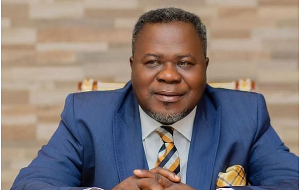- Home - News
- TWI News | TV
- Polls
- Year In Review
- News Archive
- Crime & Punishment
- Politics
- Regional
- Editorial
- Health
- Ghanaians Abroad
- Tabloid
- Africa
- Religion
- Election 2020
- Coronavirus
- News Videos | TV
- Photo Archives
- News Headlines
- Press Release
General News of Thursday, 24 April 2008
Source: GNA
Achieving universal education will unleash potential in girls - Chief
Accra, April 24, GNA - Realising universal education would unleash untold potential and dynamism in the country, particularly among girls and out-of-school youth, Odeneho Gyapong Ababio II, President of the National House of Chiefs, said on Thursday.
"It is also the only way to effectively end poverty since by educating all children in Ghana, we will be equipping them with the requisite skills needed to survive in this sophisticated world," he explained.
Speaking at a durbar to mark Global Action Week 2008 on Thursday in Accra, Odeneho Ababio decried the physical environment of rural schools, saying this constituted a serious setback.
He therefore reiterated the idea of setting up of a Rural Education Infrastructure Fund as part of efforts to prioritise rural education in Ghana with the focal point on teachers who made learning appealing and relevant.
The Ghana National Education Campaign Coalition (GNECC) organised the durbar under the theme: "Quality Education to end Exclusion." Similar campaign durbars on the theme are being held in over 50 countries worldwide to promote access to quality basic education.
According to Odeneho Ababio, access to quality education for vulnerable children was a complex problem with interlocking technical, social, economic and industrial issues that were not easy to tackle.
He said GNECC, government and other stakeholders' efforts at bridging that gap was laudable and that the National House of chiefs was ready to complement such efforts by focussing on ways to marshal the collective promise of the country's most vulnerable children through education.
He said attaining quality education would also require that local communities were engaged or involved to take up the challenge to watch over and nurture their schools.
Mr. Bright Kofi Appiah, Chairman of GNECC, said no child could survive in the fast globalizing and sophisticated world without education and it was sad that over 70 million children worldwide continued to face various forms of exclusion to quality basic education.
He said about 70 per cent of the 800,000 children out of school in Ghana resided in rural areas while most of the rural schools lacked quality infrastructure, quality teachers, teaching and learning materials, effective supervision, among others, which had led to low performance of pupils in such schools compared to urban ones.
He said GNECC believed that rural children, like the urban ones, deserved decent shelter for learning, qualified teachers, quality teaching and learning materials to enhance performance in class.
Mr. Appiah called on the government to, as a matter of urgency, remove admission caps in teacher training colleges to encourage more people to train as teachers. He also supported the idea of setting up of a national rural education fund to speed up the rate of development of rural infrastructure.
Mrs. Angelina Baiden-Amissah, Deputy Minister of Education, Science and Sports in charge of Pre-Tertiary Education, said parental irresponsibility and poverty accounted for the many children who were still out of school even though government's policies and interventions like the school feeding program and the capitation grant were meant to alleviate some of the problems faced by parents in educating their children.
She advised parents to take interest in the education of their children by ensuring that their children were always in school and learning through school visitations to know how they were faring.
Earlier, Master Gershon Alornu of the Osu Salem Boys School presented a letter on behalf of school children in the country to President John Agyekum Kufuor, which was received by the Deputy Minister.
In the letter, Master Alornu, among others, appealed to the President to expand the feeding programme to cover all schools in the country and also increase the capitation grant. Government should also increase efforts at bridging the divide between rural and urban schools.










